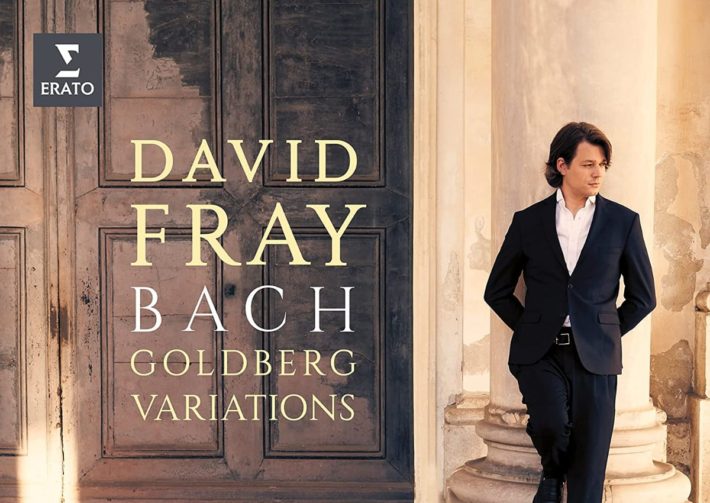The Goldberg Variations have seen several recent recordings by Lang Lang, Hannes Minnaar, Alexandra Papastefanou and Beatrice Rana, to name a few. The work’s everlasting allure is understandable, if not warranted: spanning 80-90 minutes with all repeats preserved, it is a musical and spiritual journey for performer and listener alike. David Fray is the latest to enter the scene with his new release; in his notes, he makes an unexpected but intriguing connection to Dante’s Divine Comedy (the commonality, he says, exists around the ‘theme of threes’). As these words unearthed a new angle for me, I wanted to see if his performance would do the same.
The Aria is very much a defining fingerprint: while it varies significantly across performers, it already says a lot about the character of a given interpretation. Rana and Igor Levit both take a moderately brisk pace and give the rhythmic patterns some crispness–thing we hear onwards as well. Fray (along with Lang Lang) errs on the slower side, though he doesn’t take nearly the same degree of ornamental liberty in the repeats. The simplicity, however, is what evokes a pensive feel with just the right touch of fluidity.
Fray mentions how a key aspect of the work lies in its tempo proportions. Variation 4 does justice to his claim: it’s markedly slower than a number of other versions (Schiff’s 1982 recording is a good 20 seconds faster), but that decision makes sense considering how he handles the Aria as well Variation 5. What makes things all the more convincing are Fray’s intelligent musical choices that complement the tempo: good articulation gives Variation 4 a deliberate yet stately personality. Variation 5 forgoes the blistering speed we hear in other recordings (often for the sake of virtuosity), but is no less convincing with its delightful clarity.
A curious aspect regarding proportion is how the set can be split. If one goes by the canons, tripartite groupings become immediately obvious. However, the work also has a binary division: the 16th variation essentially ‘re-welcomes’ the listener with its French Overture style. I liked how Fray approached this particular one. He balances the regality with sensitivities in the softer sections–a clever move that hearkens back to what we heard in his Aria.
Related Posts
- Bach – Goldberg Variations – A Guide to the Best Recordings
- Double Review: Bach – Goldberg Variations – Papastefanou, Minnaar
- Review: Bach – Goldberg Variations – Lang Lang
The “theme of threes” manifests itself in the three minor variations of which the “Black Pearl” (25) deserves a mention. Not only is it the longest of the series, but it is uniquely exploratory in its chromaticism and emotional color. Here, the pianist doesn’t shy away from an expressive tone or from the moments of angular poignancy; he does wisely avoid the trap of oversentimentality, thus staying true to his holistic treatment of the work. One might even hear some influence from Wilhelm Kempff (whom Fray in the past has singled out as a major musical inspiration). Kempff’s version is one of the most straightforward out there, but it is precisely this lack-of-frills that unveils the lyricism built into Bach’s melody.
Fray saves a surprise toward the very end, in a dramatic rendition of the “Quodlibet” (Variation 30). The quick ascent from an introspective opening gives the impression of a growing chorus of voices, whose power is simultaneously awesome but cathartic. The effusiveness makes it the variation that Fray chooses to stand out from the rest, but it is a rightful choice: a hard-earned homecoming after an epic journey.
The sound engineers do top-notch work in bringing out the performer’s nuanced tone quality, thus adding the extra touch of vibrancy to this multidimensional work. The liner notes by Fray himself are succinct but highlight the most interesting parts of his insights. What I appreciated in particular were the artistic challenges he identified, as they were what effectively drove the success of the performance. In striving to maintain the set’s integrity as a whole (as opposed to making variations stand out individually), his interpretation indeed feels cohesive but never loses its momentum. His musicality also comes through in how well he utilizes the modern piano’s sound capabilities.
Despite all the excellent recordings out there, Fray’s is a most welcome addition, belonging on any Goldberg aficionado’s shelf for repeated listens.

Bach: Goldberg Variations
David Fray – Piano
Erato, CD 9029660691
Recommended Comparisons
Read more classical music reviews or visit The Classic Review Amazon store











